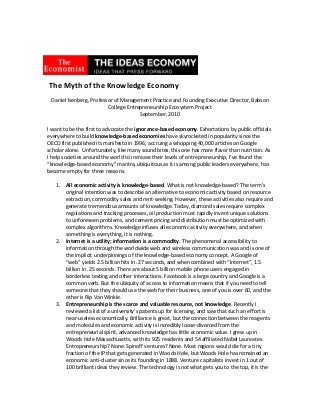
The Myth of the Knowledge Economy
- 1. The Myth of the Knowledge Economy Daniel Isenberg, Professor of Management Practice and Founding Executive Director, Babson College Entrepreneurship Ecosystem Project September, 2010 I want to be the first to advocate the ignorance-based economy. Exhortations by public officials everywhere to build knowledge-based economies have skyrocketed in popularity since the OECD first published its manifesto in 1996, accruing a whopping 40,000 articles on Google scholar alone. Unfortunately, like many sound bites, this one has more flavor than nutrition. As I help societies around the world to increase their levels of entrepreneurship, I’ve found the “knowledge-based economy” mantra, ubiquitous as it is among public leaders everywhere, has become empty for three reasons. 1. All economic activity is knowledge-based. What is not knowledge-based? The term’s original intention was to describe an alternative to economic activity based on resource extraction, commodity sales and rent-seeking. However, these activities also require and generate tremendous amounts of knowledge. Today, diamond sales require complex regulations and tracking processes, oil production must rapidly invent unique solutions to unforeseen problems, and cement pricing and distribution must be optimized with complex algorithms. Knowledge infuses all economic activity everywhere, and when something is everything, it is nothing. 2. Internet is a utility; information is a commodity. The phenomenal accessibility to information through the worldwide web and wireless communication was and is one of the implicit underpinnings of the knowledge-based economy concept. A Google of “web” yields 2.5 billion hits in .27 seconds, and when combined with “Internet”, 1.5 billion in .25 seconds. There are about 5 billion mobile phone users engaged in borderless texting and other interactions. Facebook is a large country and Google is a common verb. But the ubiquity of access to information means that if you need to tell someone that they should use the web for their business, one of you is over 60, and the other is Rip Van Winkle. 3. Entrepreneurship is the scarce and valuable resource, not knowledge. Recently I reviewed a list of a university’s patents up for licensing, and saw that such an effort is near-useless economically. Brilliance is great, but the connection between the reagents and molecules and economic activity is incredibly loose-divorced from the entrepreneurial spirit, advanced knowledge has little economic value. I grew up in Woods Hole Massachusetts, with its 925 residents and 54 affiliated Nobel Laureates. Entrepreneurship? None. Spinoff ventures? None. Most regions would die for a tiny fraction of the IP that gets generated in Woods Hole, but Woods Hole has remained an economic anti-cluster since its founding in 1888. Venture capitalists invest in 1 out of 100 brilliant ideas they review. The technology is not what gets you to the top, it is the
- 2. business acumen, the leadership ability, the salesmanship, the ability to put resources together to realize opportunity. In short compared to technology, entrepreneurship is the scarce and valuable resource. The Bliss of Ignorance The interesting, value-adding aspects of economic activity are the ones that are based on ignorance, not knowledge. It is the ability and willingness to take action in the face of fundamental ignorance, in which uncertainty, ambiguity, and the unknown play dominant roles that will determine which economies (and ventures) succeed and fail. Good managers, leaders, and policy makers have evolved effective ways of dealing with such ignorance. Successful entrepreneurs have led the way in turning ignorance into opportunity, and we can learn from their behaviors and attitudes. Entrepreneurs enter into the unknown, sometimes plunging headlong, more often than not creeping into it, toe after toe. Tom Szaky, for example, built an international “green” business, Terracycle, ignorant of the required technology for converting worm excrement into fertilizer, and completely naïve to the ways to package and sell the product, not to mention finance his early investments. He learned by doing: by jumping in, by making small mistakes and a few big ones, and by using his native intelligence and scrappiness to invent solutions as unexpected opportunities and problems arose. Slowly the landscape became clear. Szaky not only discovered the nature of this particular economic environment, but he also invented the environment. This is the way that in reality most entrepreneurs, those quintessential economic actors, work. In the past I have called this methodology of handling ignorance by acting in the face of it, “strategic opportunism.”1 At Babson College, we term it “entrepreneurial thought and action.” And at the heart of this ignorance-based economy are those economic actors who learn by doing. They embrace the learning embedded in surprise, make mistakes, improve optionality as they go along, and reframe and restructure risky situations to be less risky, in part by partnering with others who will take on some of the risk. . I firmly believe that the economic well-being of today’s societies is in encouraging entrepreneurs and their ability to deal with ignorance. If information is a commodity, is it really necessary to convince people that thinking in novel, innovative ways can lead to economic opportunity and growth? Is it necessary to persuade policy makers that investing in education and thinking is worthwhile? In 1996 a call to build the knowledge-based economy may have made sense. Not in 2010. Daniel Isenberg is the founding Executive Director of the Babson Entrepreneurship Ecosystem Project and Professor of Management Practice at Babson Global. Professor Isenberg has taught at Harvard, Columbia, INSEAD, Technion, and Reykjavik. From 1987-2004 he lived in Israel and contributed to the entrepreneurial revolution there as an entrepreneur, venture capitalist, consultant, and educator. A frequent Harvard Business Review contributor, in June, 2010 Harvard Business Review featured Professor Isenberg’s “How to Start an Entrepreneurial Revolution” as the “Big Idea” lead article. His popular blogs have appeared in Forbes, Huffington Post, Economist, and Harvard Business Review Online. Professor Isenberg is a frequent participant in Davos and the G20, and has advised municipal and regional governments around the world. 1 “The Tactics of Strategic Opportunism,” Harvard Business Review, April, 1987.
